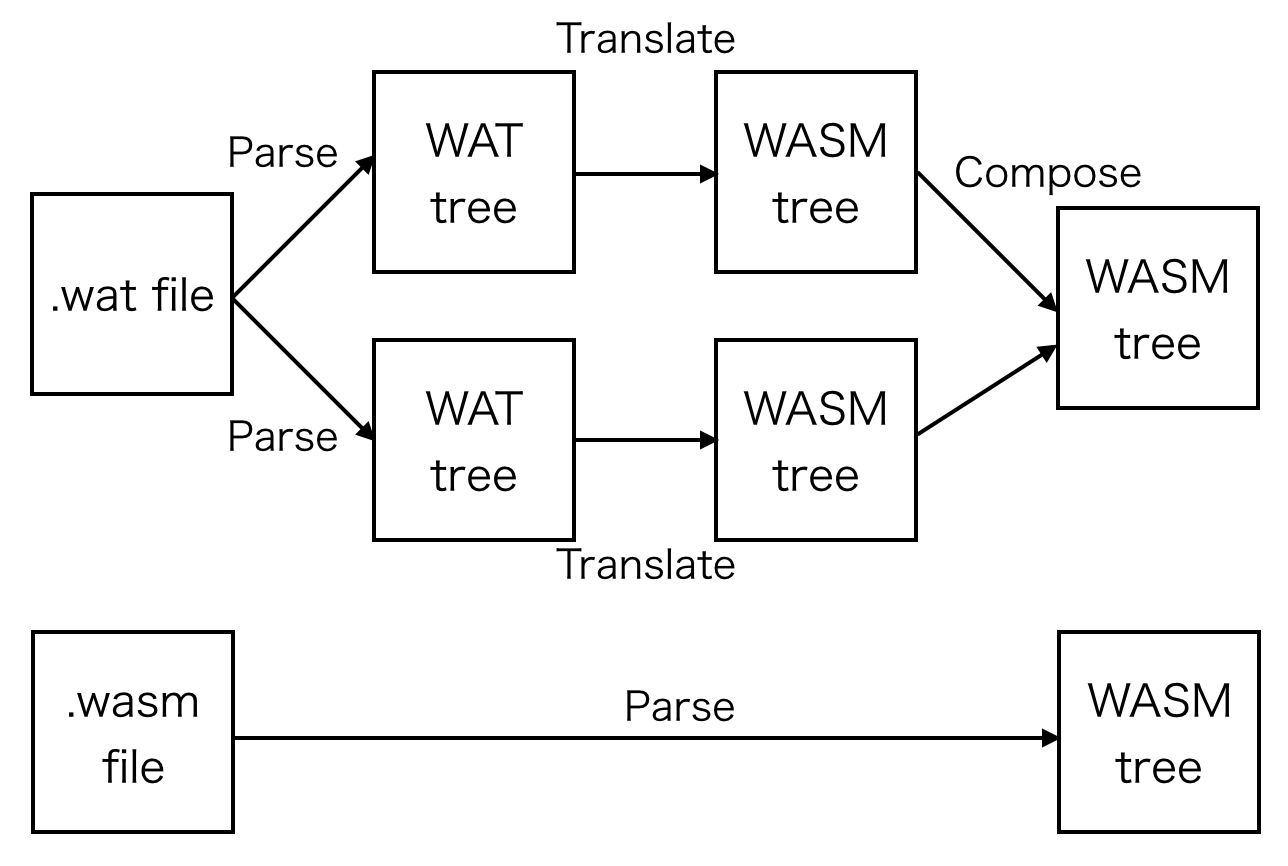
wain is a WebAssembly INterpreter written in Rust from scratch with zero dependencies. An implementation of WebAssembly.

Features:
Note that this project is in progress. Before v1.0.0 means experimental. Not all of the features are implemented yet. Current status is that all the MVP implementations have been done and many tasks are remaining.
Roadmap to v1.0.0 (priority order):
Please see the task board for current progress.
This project started for fun and understanding Wasm deeply.
wain crate is not published yet. Please clone this repository and build the project by cargo build.
Minimum supported Rust version is 1.43.0.
$ cargo install wain
$ wain --help
If you don't want to run text format code, it can be omitted:
```
$ cargo install wain --no-default-features --features binary ```
wain commandRun a binary format Wasm source file:
$ wain examples/hello/hello.wasm
Hello, world
Run a text format Wasm source file:
$ wain examples/hello/hello.wat
Hello, world
Without argument, wain command detects both binary format and text format from stdin and runs the
input.
$ wain < examples/hello/hello.wasm
Hello, world
$ wain < examples/hello/hello.wat
Hello, world
Please see examples directory for more examples.
Current restrictions are as follows:
int putchar(int) and int getchar() are implemented as external functions by defaultwain consists of multiple crates.
.wasm files).
Implementation for Wasm binary format spec. It parses &[u8] value into
wain_ast::Root abstract syntax tree.wat files).
Implementation for Wasm text format spec. It parses &str value into
wain_ast::Root abstract syntax treewain-* crates are libraries as modular implementation of WebAssembly. They can parse, validate,
execute WebAssembly code.
Here is an example code to run the interpreter from Rust.
```rust extern crate wainsyntaxbinary; extern crate wainvalidate; extern crate wainexec;
use std::fs; use std::process::exit; use wainsyntaxbinary::parse; use wainvalidate::validate; use wainexec::execute;
// Read wasm binary let source = fs::read("foo.wasm").unwrap();
// Parse binary into syntax tree let tree = match parse(&source) { Ok(tree) => tree, Err(err) => { eprintln!("Could not parse: {}", err); exit(1); } };
// Validate module if let Err(err) = validate(&tree) { eprintln!("This .wasm file is invalid!: {}", err); exit(1); }
// Execute module if let Err(trap) = execute(&tree.module) { eprintln!("Execution was trapped: {}", trap); exit(1); } ```
Or invoke specific exported function with arguments
```rust // ...(snip)
use wain_exec::{machine, DefaultImporter, Value}; use std::io;
// Create default importer to call external function supported by default let stdin = io::stdin(); let stdout = io::stdout(); let importer = DefaultImporter::with_stdio(stdin.lock(), stdout.lock());
// Make abstract machine instance let mut machine = match Machine::instantiate(&tree.module, importer) { Ok(m) => m, Err(err) => { eprintln!("could not instantiate module: {}", err); exit(1); } };
// Let's say int add(int, int) is exported
match machine.invoke("add", &[Value::I32(10), Value::I32(32)]) {
Ok(ret) => {
// ret is type of Option<Value> where it contains Some value when the invoked
// function returned a value. Otherwise it's None value.
if let Some(Value::I32(i)) = ret {
println!("10 + 32 = {}", i);
} else {
unreachable!();
}
}
Err(trap) => eprintln!("Execution was trapped: {}", trap),
}
```
By default, only following C functions are supported in env module as external functions
int putchar(int) (in wasm (func (param i32) (result i32)))int getchar(void) (in wasm (func (param) (result i32)))void *memcpy(void *, void *, size_t) (in wasm (func (param i32 i32 i32) (result i32)))But you can implement your own struct which implements wain_exec::Importer for defining external
functions from Rust side.
```rust extern crate wainexec; extern crate wainast; use wainexec::{Machine, Stack, Memory, Importer, ImportInvokeError, ImportInvalidError} use wainast::ValType;
struct YourOwnImporter { // ... }
impl Importer for YourOwnImporter {
fn validate(&self, name: &str, params: &[ValType], ret: Optionname is a name of function to validate. params and ret are the function's signature.
// Return ImportInvalidError::NotFound when the name is unknown.
// Return ImportInvalidError::SignatureMismatch when signature does not match.
// wainexec::checkfunc_signature() utility is would be useful for the check.
}
fn call(&mut self, name: &str, stack: &mut Stack, memory: &mut Memory) -> Result<(), ImportInvokeError> {
// Implement your own function call. name is a name of function and you have full access
// to stack and linear memory. Pop values from stack for getting arguments and push value to
// set return value.
// Note: Consistency between imported function signature and implementation of this method
// is your responsibility.
// On invocation failure, return ImportInvokeError::Fatal. It is trapped by interpreter and it
// stops execution immediately.
};
}
let ast = ...; // Parse abstract syntax tree and validate it
let mut machine = Machine::instantiate(&ast.module, YourOwnImporter{ /* ... */ }).unwrap(); let run = machine.execute().unwrap(); ```
To know the usage of APIs, working examples are available at examples/api/.
Here I note some points on each phase of interpretation.

wain-syntax-binary parses .wasm binary file into wain_ast::Root abstract
syntax tree following binary format spec. Wasm binary format is designed to be
parsed by basic LL(1) parser. So parsing is very straightforward.
Parser implementation is smaller than 1000 lines.
In contrast, implementation of parsing text format is more complicated. wain-syntax-text
parses .wat text file into wain_ast::Root abstract syntax tree following text format spec.
.wat file into WAT sytnax tree which is dedicated for text format resolving many
syntax sugars. Since multiple modules can be put in .wat file, it can be parsed into multiple treeswain_ast::Root) resolving identifiers.
Identifiers may refer things not defined yet (forward references) so .wat file cannot be parsed
into common Wasm syntax trees directlyValidation is done by traversing a given Wasm syntax tree in wain-validate crate. Conforming spec, following things are validated:
select. Since almost all instructions
are not polymorphic, almost all type checks can be done in validationConforming the spec, wain validates instructions after unreachable instruction. For example,
wat
(unreachable) (i64.const 0) (i32.add)
i32.add is invalid because it should take two i32 values from stack but at least one i64 value
is in the stack.
wain-exec crate interprets a Wasm syntax tree conforming spec. Thanks to validation, checks at runtime are minimal (e.g. function signature on indirect call).
Currently wain interprets a Wasm syntax tree directly. I'm planning to define intermediate representation which can be interpreted faster.
Entrypoint is 'start function' which is defined either
start section_start in export sectionThe 1. is a standard entrypoint but Clang does not emit start section. Instead it handles _start
function as entrypoint. wain implements both entrypoints (1. is prioritized).